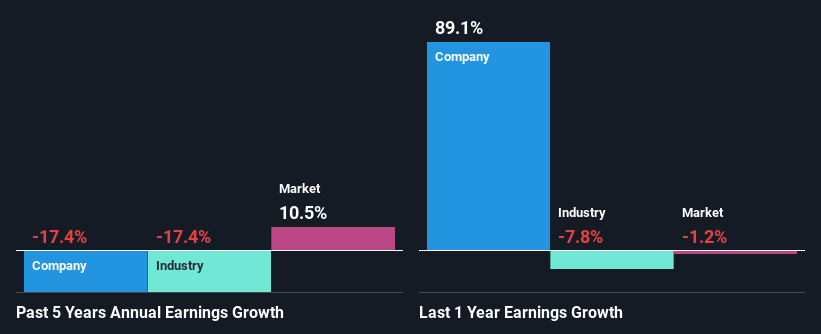Should Weakness in Soup Holdings Limited's (SGX:5KI) Stock Be Seen As A Sign That Market Will Correct The Share Price Given Decent Financials?
Soup Holdings (SGX:5KI) has had a rough month with its share price down 12%. However, the company's fundamentals look pretty decent, and long-term financials are usually aligned with future market price movements. Specifically, we decided to study Soup Holdings' ROE in this article.
ROE or return on equity is a useful tool to assess how effectively a company can generate returns on the investment it received from its shareholders. Simply put, it is used to assess the profitability of a company in relation to its equity capital.
View our latest analysis for Soup Holdings
How Do You Calculate Return On Equity?
Return on equity can be calculated by using the formula:
Return on Equity = Net Profit (from continuing operations) ÷ Shareholders' Equity
So, based on the above formula, the ROE for Soup Holdings is:
13% = S$1.5m ÷ S$11m (Based on the trailing twelve months to December 2022).
The 'return' is the yearly profit. One way to conceptualize this is that for each SGD1 of shareholders' capital it has, the company made SGD0.13 in profit.
What Has ROE Got To Do With Earnings Growth?
So far, we've learned that ROE is a measure of a company's profitability. We now need to evaluate how much profit the company reinvests or "retains" for future growth which then gives us an idea about the growth potential of the company. Generally speaking, other things being equal, firms with a high return on equity and profit retention, have a higher growth rate than firms that don’t share these attributes.
Soup Holdings' Earnings Growth And 13% ROE
To start with, Soup Holdings' ROE looks acceptable. Especially when compared to the industry average of 3.9% the company's ROE looks pretty impressive. For this reason, Soup Holdings' five year net income decline of 17% raises the question as to why the high ROE didn't translate into earnings growth. Therefore, there might be some other aspects that could explain this. These include low earnings retention or poor allocation of capital.
Next, on comparing with the industry net income growth, we found that Soup Holdings' earnings seems to be shrinking at a similar rate as the industry which shrunk at a rate of a rate of 17% in the same period.
Earnings growth is an important metric to consider when valuing a stock. What investors need to determine next is if the expected earnings growth, or the lack of it, is already built into the share price. This then helps them determine if the stock is placed for a bright or bleak future. If you're wondering about Soup Holdings''s valuation, check out this gauge of its price-to-earnings ratio, as compared to its industry.
Is Soup Holdings Efficiently Re-investing Its Profits?
With a high three-year median payout ratio of 65% (implying that 35% of the profits are retained), most of Soup Holdings' profits are being paid to shareholders, which explains the company's shrinking earnings. The business is only left with a small pool of capital to reinvest - A vicious cycle that doesn't benefit the company in the long-run. To know the 4 risks we have identified for Soup Holdings visit our risks dashboard for free.
Moreover, Soup Holdings has been paying dividends for at least ten years or more suggesting that management must have perceived that the shareholders prefer dividends over earnings growth.
Summary
In total, it does look like Soup Holdings has some positive aspects to its business. However, while the company does have a high ROE, its earnings growth number is quite disappointing. This can be blamed on the fact that it reinvests only a small portion of its profits and pays out the rest as dividends. Until now, we have only just grazed the surface of the company's past performance by looking at the company's fundamentals. You can do your own research on Soup Holdings and see how it has performed in the past by looking at this FREE detailed graph of past earnings, revenue and cash flows.
Have feedback on this article? Concerned about the content? Get in touch with us directly. Alternatively, email editorial-team (at) simplywallst.com.
This article by Simply Wall St is general in nature. We provide commentary based on historical data and analyst forecasts only using an unbiased methodology and our articles are not intended to be financial advice. It does not constitute a recommendation to buy or sell any stock, and does not take account of your objectives, or your financial situation. We aim to bring you long-term focused analysis driven by fundamental data. Note that our analysis may not factor in the latest price-sensitive company announcements or qualitative material. Simply Wall St has no position in any stocks mentioned.
Join A Paid User Research Session
You’ll receive a US$30 Amazon Gift card for 1 hour of your time while helping us build better investing tools for the individual investors like yourself. Sign up here

